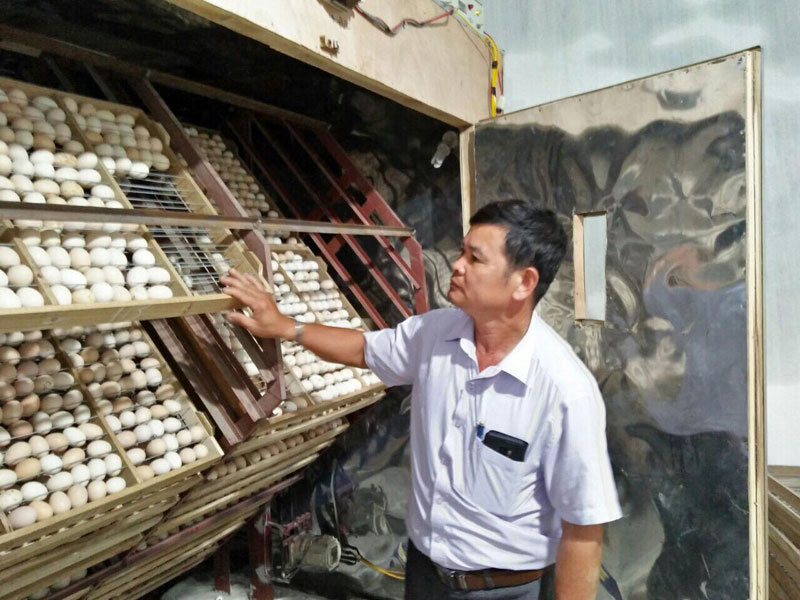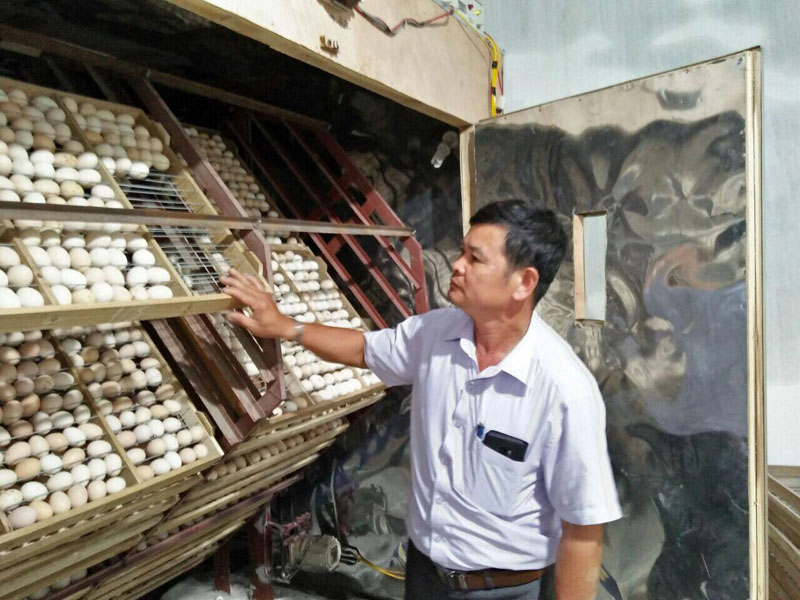
(HBO) - From a farmer who have been living in poverty, Mr. Nguyen Duy Lanh in Bot village, Phu Thanh commune (Lac Thuy) has reached to become a typical producer and business model of the district, provincial and national levels.

The farmer Nguyen Duy Lanh invests in egg
hatching machine
In 2004, the new start-up path was officially
opened after he was invited by the Phu Thanh Farmers Association to attend a
training course on citrus development model. He boldly borrowed 2 hectares of
land from the bank, bought yellow oranges and Dien grapefruit for planting.
Four years later, when the oranges, grapefruit were developed and harvested, he
switched to raising chickens with the initial number from 100 to 500 chickens
and increased from 1,000 to 3,000 chickens/ litter.
His family boldly raised 2,000 laying hens,
and bought 4 hatching machines with a capacity of 12,000 pesos per machine. At
that time, the family provided about 30,000 breeding chickens and 20 - 30 tons
of commercial chicken to the market. Three years ago, when the farming economy
tended to develop, he decided to expand the scale of the farm, investing in
building a super lean pork farm with a capacity of 300 pigs per litter. Then,
he built three other porker farms with the capacity of 100 - 200 pigs per
litter. The total porkers in four farms ranged from 600 to 800 pigs.
Since 2012 up to now, Nguyen Duy Lanh's model
of breeding farms combined with animal husbandry has achieved continuous
successes. In 2012, he achieved the total revenue of 2 billion VND, except for
expenses of 1.5 billion VND, he had a profit of 500 million VND. In 2013, the
total revenue was 2.5 billion VND, after deducting the cost of 1.8 billion VND,
he gained a profit of 700 million VND. In 2014, the total revenue was 3.2 billion
VND, except for the cost of 2.6 billion VND, the profit reached at 600 million
VND. In 2017, the total revenue was nearly 10 billion VND but due to losses in
investment in pig production, except for
expenses, profits remained at 600 million VND. In the first months of this
year, he has just exported over 30 tonnes of pigs at the price of 42,000 VND/
kg, the increasing market price helped him partly offset the loss of pig
production last year.
According to data from the Hoa Binh Provincial Party Committee, the industrial production index for the first six months of 2025 is estimated to have increased by 20% compared to the same period last year. This marks the highest year-on-year growth rate for this period since 2020.
In the first six months of 2025, Hoa Binh province’s export turnover was estimated at 1.145 billion USD, marking an 18.11% increase compared to the same period in 2024. Import turnover was estimated at $ 804 million, a 17.15% increase, which helped the province maintain a positive trade balance.
The lives of the ethnic minority farmers in Tan Lac district have gradually improved thanks to the new directions in agricultural production. This is a testament to the collective strength fostered through the professional associations and groups implemented by various levels of the district’s Farmers’ Union.
With the motto the "product quality comes first,” after nearly one year of establishment and operation, Muong village’s Clean Food Agricultural and Commercial Cooperative, located in Cau Hamlet, Hung Son Commune (Kim Boi district), has launched reputable, high-quality agricultural products to the market that are well-received by consumers. The products such as Muong village’s pork sausage, salt-cured chicken, and salt-cured pork hocks have gradually carved out a place in the market and they are on the path to obtaining the OCOP certification.
In the past, the phrase "bumper harvest, rock-bottom prices" was a familiar refrain for Vietnamese farmers engaged in fragmented, small-scale agriculture. But today, a new spirit is emerging across rural areas of Hoa Binh province - one of collaboration, organisation, and collective economic models that provide a stable foundation for production.
Maintaining growing area codes and packing facility codes in accordance with regulations is a mandatory requirement for agricultural products to be eligible for export. Recently, the Department of Agriculture and Environment of Hoa Binh province has intensified technical supervision of designated farming areas and packing facilities to safeguard the "green passport" that enables its products to access international markets.



